- AI Fire
- Posts
- 📉 SEO Is Dead. Here Are The 5 AI Trends Replacing It In 2026
📉 SEO Is Dead. Here Are The 5 AI Trends Replacing It In 2026
Why backlinks are obsolete and "zero-click" search is taking over. This guide reveals the new rules of AI visibility: citations, authority & voice

TL;DR BOX
SEO in 2026 requires moving from old link strategies to building brand mentions and authority for AI visibility. AI now prefers real brand mentions in trusted publications over just having many links or content from sites like Reddit.
This guide explains five key trends, including the rise of AI shopping and voice search dominance. Businesses must adapt by proving they are experts and getting ready for new AI ads.
Key points
Stat: A Search Engine Land report showed a 527% increase in visits from AI. This means AI platforms are becoming main sources of traffic.
Mistake: Using too many keywords or single blog posts. AI now punishes weak content that does not cover the topic fully.
Action: Spend 10-15% of your ad budget to test new AI ads on platforms like ChatGPT and Google AI Overviews.
Critical insight
Voice search creates a "winner-takes-all" market. Only the top answer exists, so second place is basically invisible.
🗳️ Your SEO traffic is dying. 📉 What’s your urgent fix for 2026? |
Table of Contents
I. Introduction: The Game Has Changed (And You're Already Behind)
If you are still thinking about SEO the way you did two years ago, you are already behind.
I have been in the SEO game for a long time. I have seen every Google update from Panda to mobile-first. But nothing compares to what is happening right now.
AI isn't just changing SEO; it is completely changing how visibility and traffic work. This is the biggest AI trend of our time. ChatGPT, Perplexity and Google's AI Overviews are no longer just "extra" channels. They are becoming the main way people find information and buy products.
Most businesses haven't realized the rules have changed. They are still playing by the old rules. This guide breaks down the five massive AI trends that will define 2026 and exactly what you need to do to stay visible.
II. AI Trend 1: Brand Citations Are Replacing Backlinks
For twenty years, SEO depended on one thing: backlinks. The more quality sites linking to you, the higher you rank. Simple formula. Predictable results.
That formula is breaking down.
1. The Old Game vs. The New Game
Old SEO Method: Get bloggers and average sites to link to your content. Get many links and hope Google rewards you.
The New Reality: When someone asks Perplexity, "What's the best email marketing platform?", it doesn't show a list based on links. Instead, it talks about brands naturally: "MailerLite: Known for being easy to use, cheap and having advanced features..".
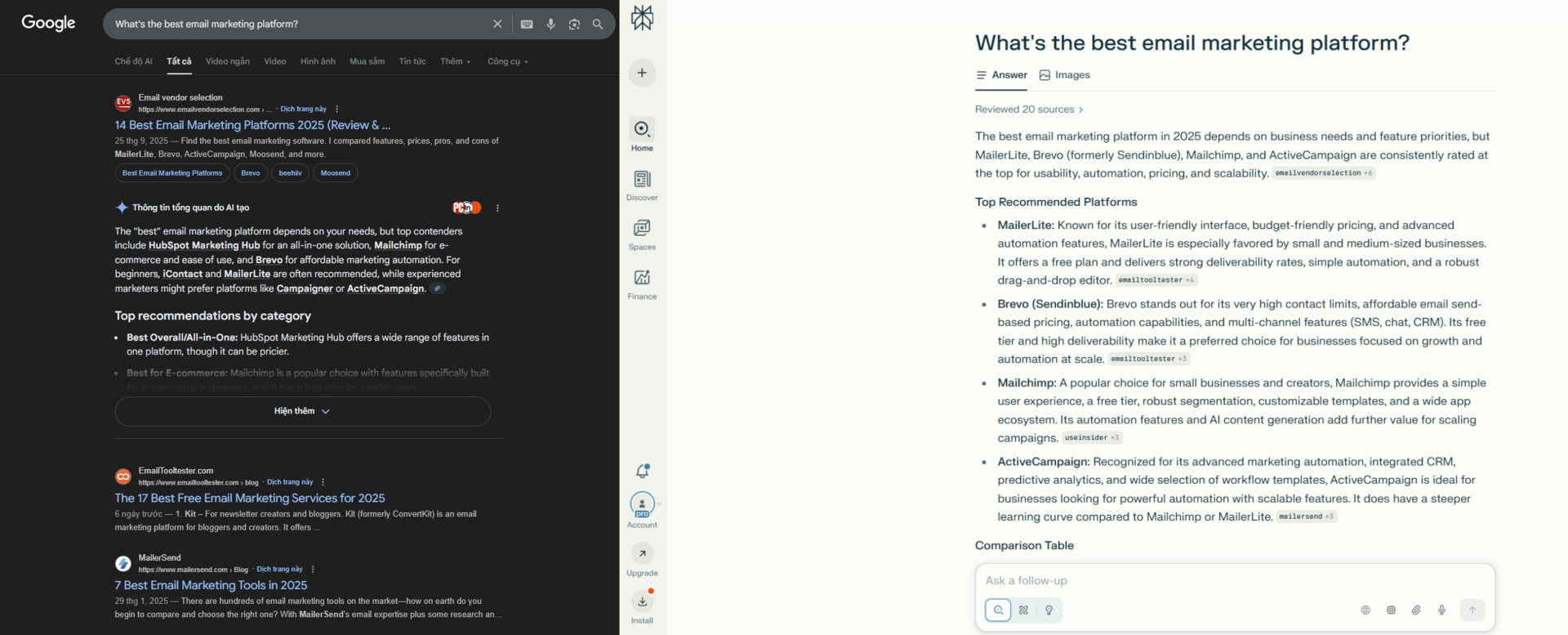
See the difference? The AI isn't counting links. It is checking if the brand is trustworthy.
Learn How to Make AI Work For You!
Transform your AI skills with the AI Fire Academy Premium Plan - FREE for 14 days! Gain instant access to 500+ AI workflows, advanced tutorials, exclusive case studies and unbeatable discounts. No risks, cancel anytime.
Large Language Models (LLMs) are creating their own trust scores instantly based on three key factors:
a. Source Relevance: If a random blog mentions your brand, it helps a little. But if Forbes or the New York Times mentions you, that is very important. AI systems are getting smarter at telling the difference between trusted sources and bad ones.
b. Domain Credibility and Age: AI can see which websites are real experts and which are trying to cheat. Your domain's history, consistency and reputation matter more than ever.
c. Brand Framing in Content: Are you mentioned as a leader or just briefly named? Are you cited as a solution or simply listed alongside competitors? AI looks at how your brand is mentioned, not just if it is mentioned.

3. The Data Behind the Shift
According to SEMrush's SEO Branding Report, brand reputation, mentions and sentiment are becoming more important than links in AI search. This mirrors PageRank's early evolution but the stakes are higher because AI makes these authority judgments in real-time across every query with zero transparency.

Source: SEMrush's SEO Branding Report
4. What You Need to Do Now
Shift from link building to citation building. Get your brand mentioned in authoritative publications. Talk to journalists as an expert, help with industry reports, go on good podcasts and be in case studies. (If they link to you, great - but the mention matters more than the link itself).
Track your AI visibility. Use emerging AI visibility tools and manual testing to see where your brand appears in ChatGPT, Perplexity and Google AI results. Most businesses don't realize they're already invisible in AI search. You can't fix what you don't measure.
Manage brand sentiment everywhere. AI is crawling your reviews (Google, Yelp, G2), social media mentions and industry discussions. All of this affects your AI score. This AI trend means bad reviews hurt your visibility even if you have strong mentions.
The bottom line: Brands getting quality mentions now will win in 2026. Those still chasing old links will lose their traffic.
III. AI Trend 2: Community Platforms Are Losing AI Ranking Power
Reddit and Quora used to be SEO goldmines. Post helpful answers, accumulate upvotes and watch your brand visibility grow.
That playbook is dying fast.
1. Why Community Platforms Are Falling Out of Favor
According to Contensify HQ's B2B SaaS Trends Report, community platforms are crowded. AI tools are now preferring content from verified experts.
The reason? These platforms are easy to cheat with bots, fake likes and coordinated voting. AI systems are smart enough to see this cheating. So, they value community content less.
2. What AI Prioritizes Instead
When ChatGPT answers a medical question, it doesn't cite a Reddit thread with 500 upvotes. It prioritizes:
Articles from verified medical professionals.
Content with author credentials.
Published research and studies.
Industry-recognized experts.
AI asks two critical questions: who wrote this content and what are their verifiable credentials? A comment from a random user will never beat content from verified experts on trusted websites.

3. What You Need to Do Now
Stop depending on community platforms for SEO. They are losing importance quickly. Your time is better spent elsewhere.
Publish on industry-specific authoritative sites. Focus on magazines in your field, famous blogs, academic sites and professional groups. This is where AI systems actually look for experts.
Establish your credentials publicly. Make sure you have author names, detailed bios with skills, professional certificates and links to your work. AI looks for these signs of trust. Being an expert on whole topics helps AI mention you.
IV. AI Trend 3: LLMs Are Becoming Transaction Endpoints
For years, the goal of SEO was simple: get people to your website. More clicks meant more chances to sell.
AI platforms are making that model outdated.
1. The Commerce Integration Revolution
In September 2025, OpenAI partnered with Stripe to allow instant payment inside ChatGPT. Now when you ask, "Find me a pair of stylish, mid-range over-ear headphones for casual listening", ChatGPT:
Think about that. The sale happens inside the AI app.

2. The Traffic Paradox
Search Engine Land's August 2025 report showed a 527% increase in AI-referred sessions. But here is the key point most people miss: That number means AI platforms are becoming traffic sources themselves, not just sending people elsewhere.
Remember how Facebook built ads to keep users inside Facebook? How Instagram created checkout in the app to stop people from leaving? AI platforms are doing the same thing, only faster and smoother. When ChatGPT can take payments, book appointments, handle signups and finish sales... why would it send users anywhere else?
3. How to Adapt Your Strategy
This doesn't mean the end of website traffic but it means you need to adapt.
Stop thinking about AI as a referral source. It's a sales channel. Your brand needs to exist inside these platforms, not just be mentioned by them.
Optimize for sales inside the app. Get integrated with the commerce systems AI platforms are building (like ChatGPT's Stripe integration and future payment systems from Google/Perplexity).
Track AI sales separately. Most tracking tools won't show you when someone buys inside an AI app. You need new tracking systems to see how well AI channels work.
V. AI Trend 4: AI Ads Are About to Take Over Organic
Remember when Google search was just 10 blue links? Then Google Ads started and suddenly you had to scroll past many ads to see real results. Clicks on real results dropped and businesses had to pay just to stay visible.
The exact same thing is about to happen inside ChatGPT and every other AI platform.
1. The Monetization Wave Is Coming
According to a report from Search Engine Land, OpenAI is preparing to launch its own ad platform in 2026. They are hiring ad experts, building sales teams and creating AI ad styles.
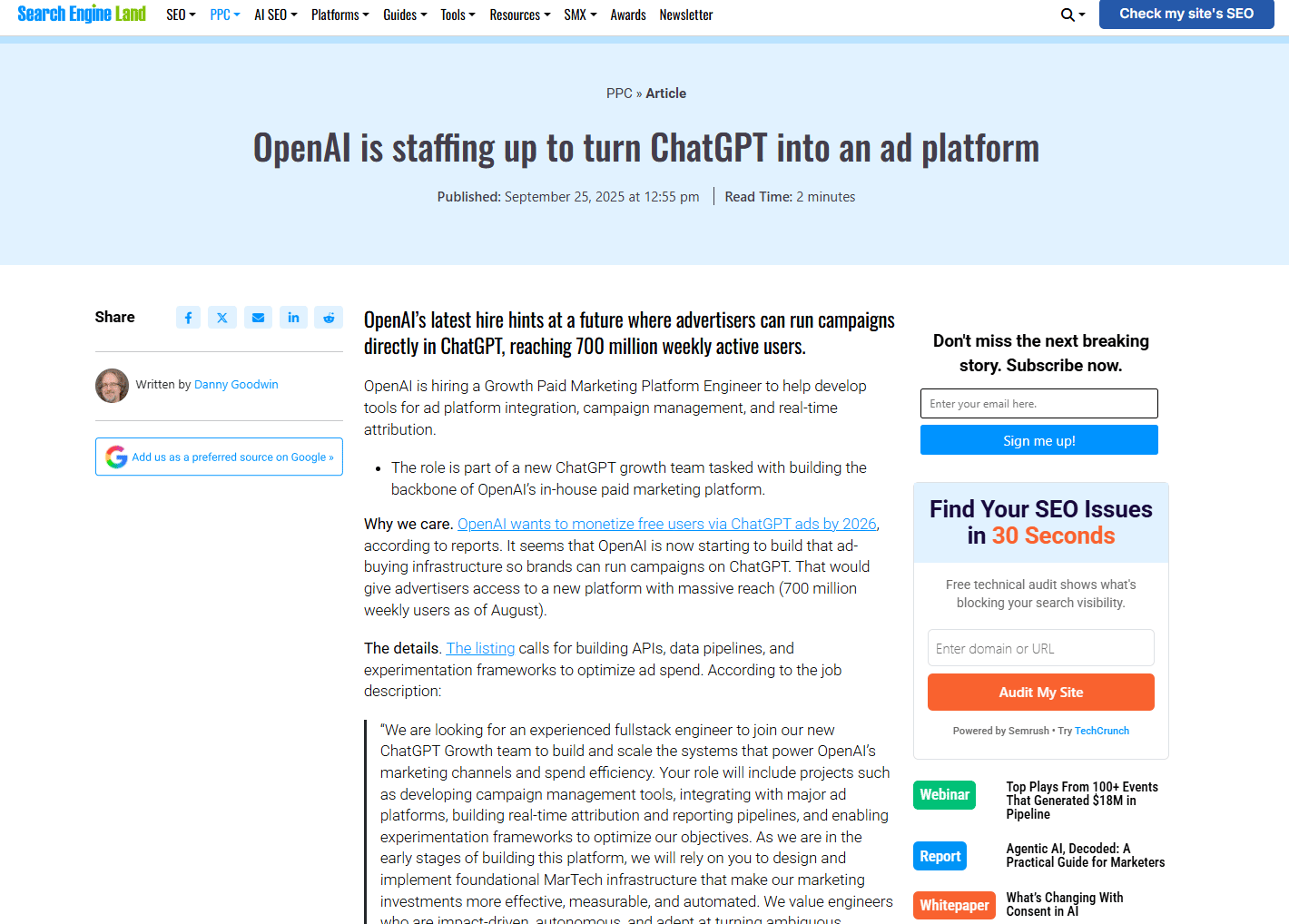
Source: Search Engine Land Report
2. What This Means for Organic Visibility
When ads take over AI answers, real brand mentions will be seen less. The brands winning in AI search in 2025 will be seen much less in 2026, unless they pay.
It's traditional SEO all over again:
Organic traffic is still valuable.
But many searchers will click paid ads.
People who start early get better spots for less money.
3. How to Prepare for the AI Ads Wave
Get as much free visibility as possible before ads start. Build your brand authority and mentions while free spots are still common. (This is why Trends 1 and 2 matter so much right now).
Use 10-15% of your ad budget to test AI platforms. When ChatGPT ads start, you want money ready to buy early ads at lower costs. Meanwhile, Google has already started using AI ads - you can start ads in Google AI Overviews right now.
Test early when platforms launch. Early users always get better results, lower costs and better spots before competition grows.
VI. AI Trend 5: Voice-Based AI Search Creates Winner-Takes-All Markets
In voice search, being #1 is the only thing that matters. Second place doesn't exist.
1. The Winner-Takes-All Game of Voice
When someone asks their smart speaker, “Order me the best chicken sandwich nearby.”
Only one restaurant gets the sale.
No list of restaurants.
No chance for anyone else to compete.
There's no scrolling through options.
No comparison shopping.
No "see more results".
The AI chooses one place. End of story.
2. The Visibility Concentration Effect
As more people use AI, visibility goes to a very small part of the market.
This changes the market completely. The old search allowed many winners; the top 3 results all got good traffic. Voice search creates monopolies.
The #1 answer gets almost all the value.
Creating quality AI content takes serious research time ☕️ Your coffee fund helps me read whitepapers, test new tools and interview experts so you get the real story. Skip the fluff - get insights that help you understand what's actually happening in AI. Support quality over quantity here!
3. What You Need to Do Now
Optimize for voice questions. Voice searches are conversational and sound like questions. Your content needs to directly answer "What's the best..". and "Who should I use for..". questions in your field.
Lead your category. You can't just be "a good option". You need to be the best answer. AI only suggests the most trusted brand. Being weak means being invisible.
Test your voice visibility now. Ask ChatGPT, Siri, Google Assistant and Alexa questions your customers would ask. If your brand isn't suggested first, you are already losing.
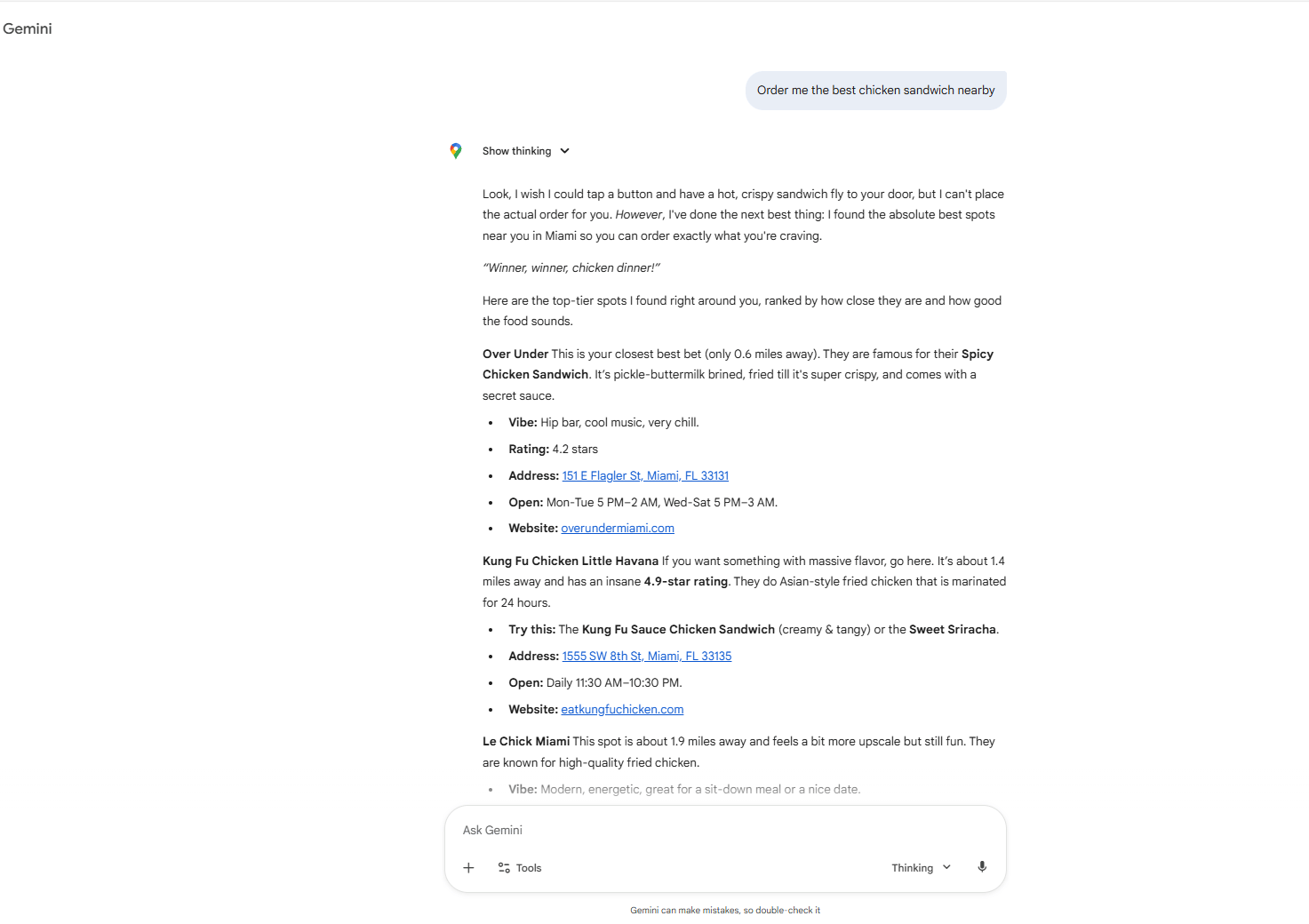
VII. Bonus Trend: Keywords Are Dead, Topics Rule
If you asked an SEO expert in 2023 how to rank for "email marketing", they would say: create a detailed guide on email marketing.
In 2026, that strategy fails.
1. Why Keyword Optimization No Longer Works
AI doesn't read content the way old Google algorithms did. More keywords ≠ more relevance anymore. In fact, using too many keywords will likely flag your content as low quality.
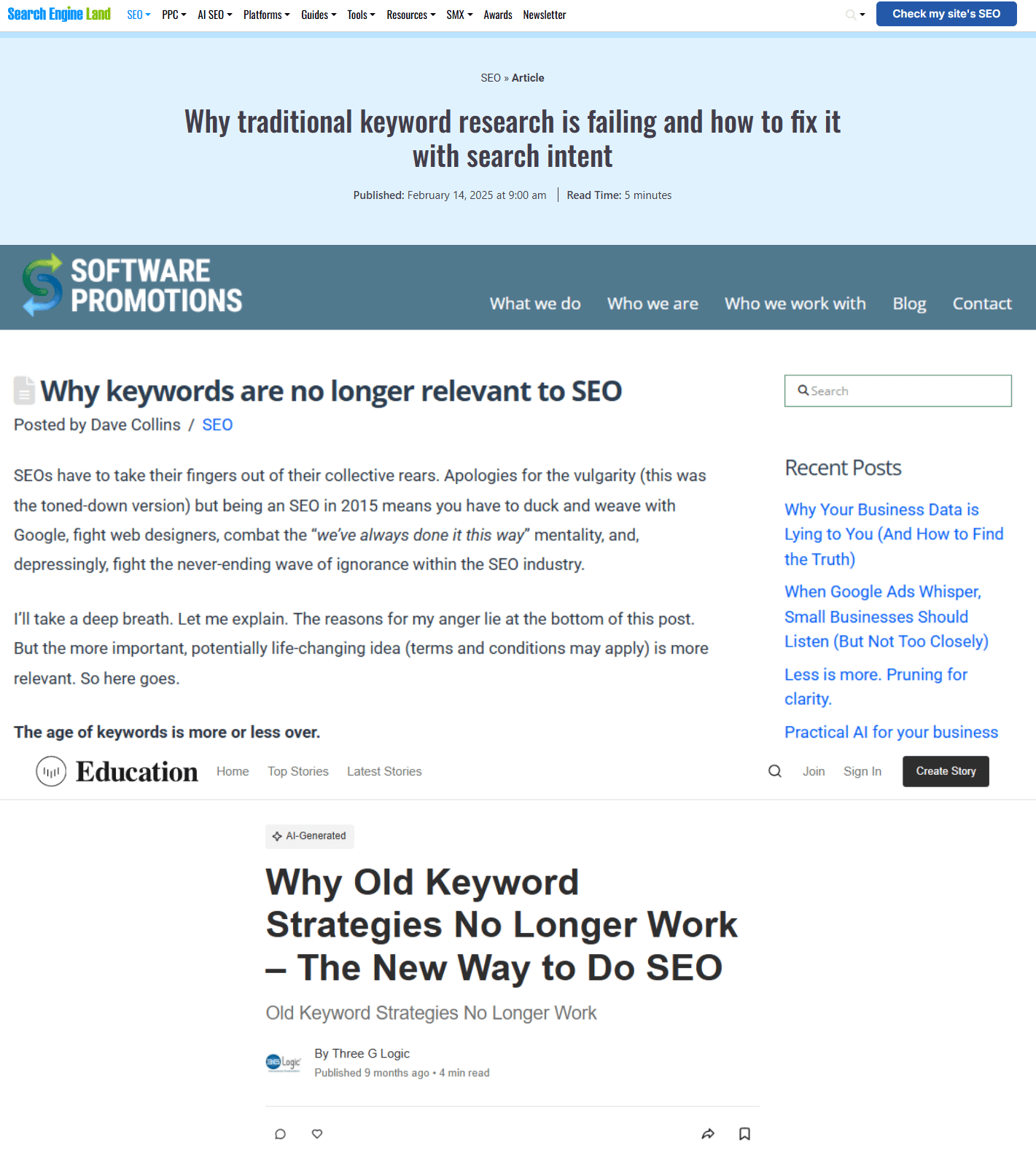
2. What AI Actually Looks For
Multiple studies show that SERP success now depends on covering the whole topic and matching user needs. When someone asks about email delivery, AI doesn't just look for that exact phrase repeated. It looks for everything related to the topic: sender reputation, security checks (SPF, DKIM, DMARC), list cleaning, engagement numbers and how spam filters work.
The full topic. Businesses creating weak content for single keywords will become invisible.
3. How to Adapt
Check your content for topic coverage, not keywords. Stop counting keywords. Start covering the whole topic.
Build content hubs that cover subjects completely. Not single posts for single keywords. Connected content that shows deep knowledge across a whole topic.
Structure content so AI understands it. Use clear headers, data tags, full explanations and natural language.
VIII. Conclusion: Adapt or Become Invisible
These five trends aren't guesses. They are already happening. This AI shift is happening right now. Businesses that adapt will lead their markets. Those that don't will be left behind, wondering where their traffic went.
Your Action Plan:
Shift to getting mentions: Get mentioned by trusted sources.
Leave community platforms behind: Focus on verified expert content.
Prepare for sales inside AI: Connect with AI sales systems.
Set aside money for AI ads: Test early when platforms start.
Optimize for voice: Be the best answer in your category.
Cover topics completely: Stop chasing keywords.
The question isn't if AI will change SEO. It already has. The question is: Will you adapt fast enough to stay visible?
If you are interested in other topics and how AI is transforming different aspects of our lives or even in making money using AI with more detailed, step-by-step guidance, you can find our other articles here:
What do you think about the AI Report series? |
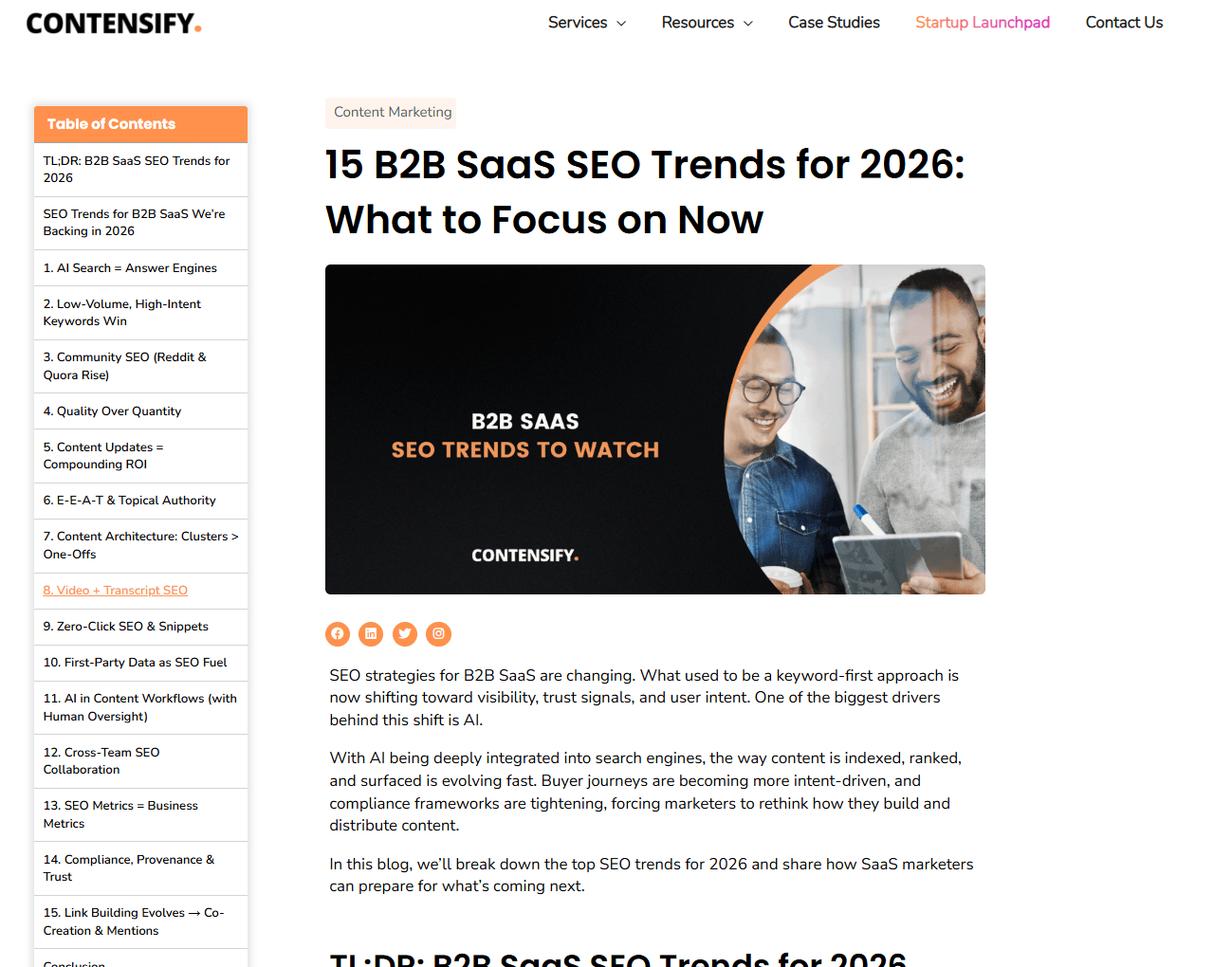
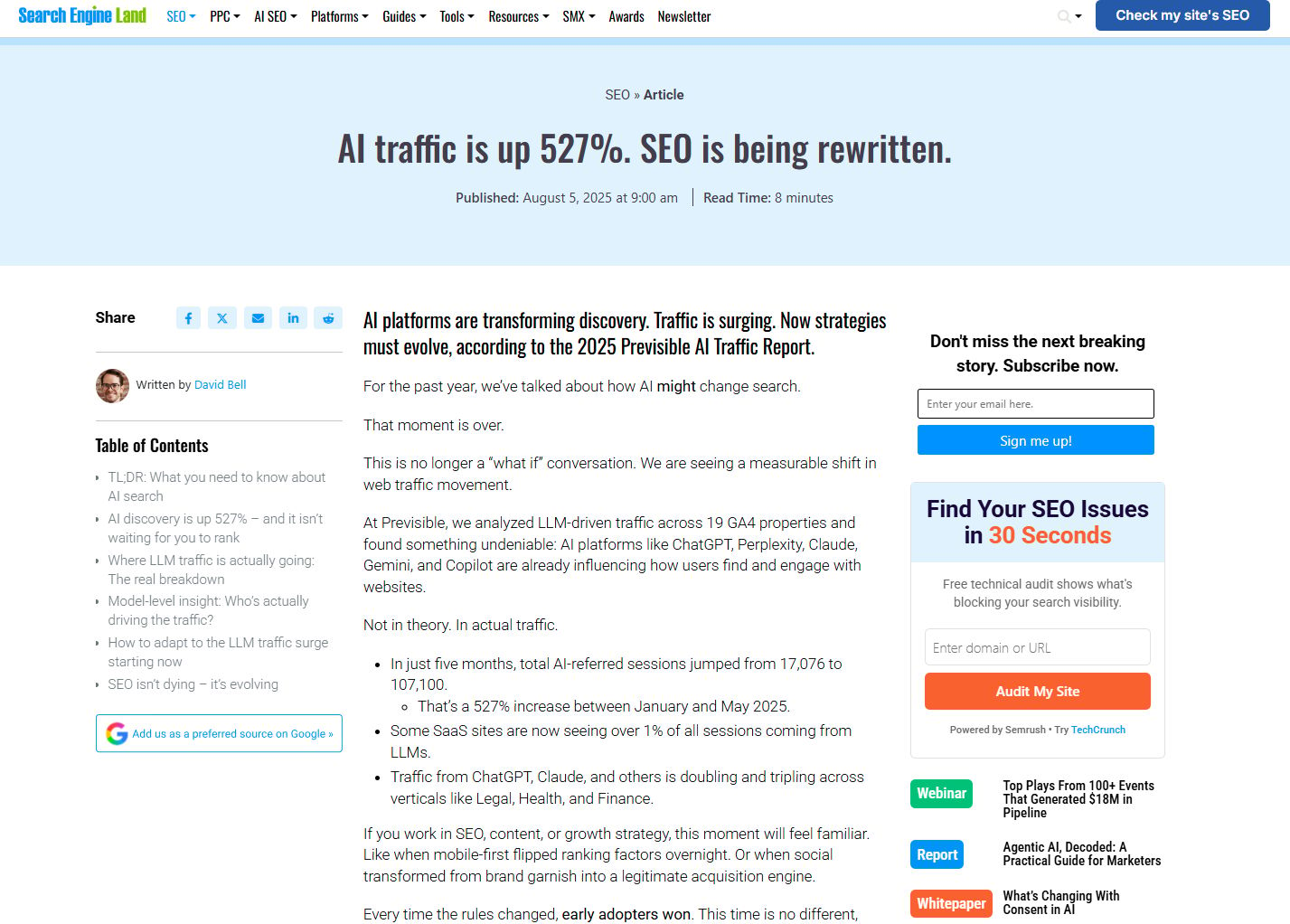
Reply